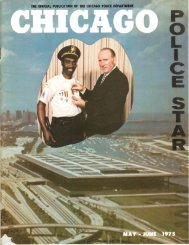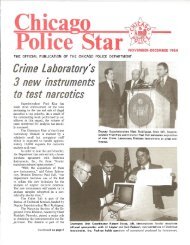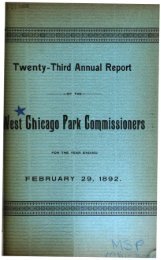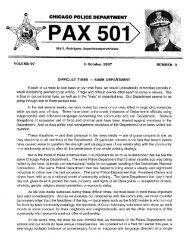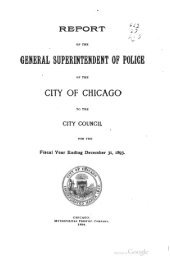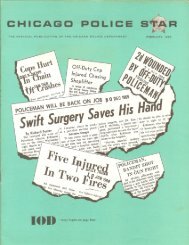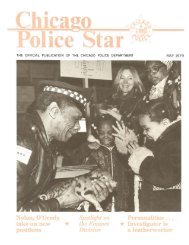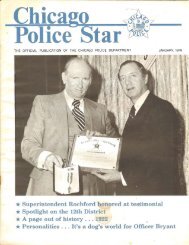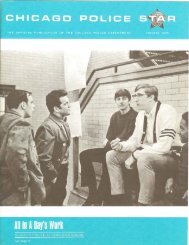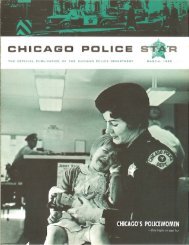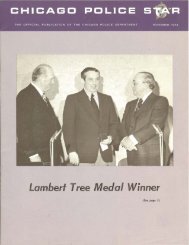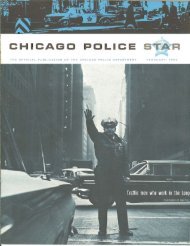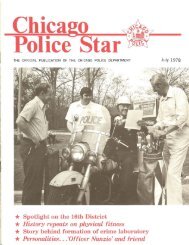CHICAGO POLIC STAR - Chicago Cop.com
CHICAGO POLIC STAR - Chicago Cop.com
CHICAGO POLIC STAR - Chicago Cop.com
Create successful ePaper yourself
Turn your PDF publications into a flip-book with our unique Google optimized e-Paper software.
u AR<br />
<strong>Chicago</strong> Police Organization<br />
This study finds the <strong>Chicago</strong> Police<br />
Department to be in excellent condition.<br />
Reorganization began and is continuing<br />
with purpose, orderliness, and results.<br />
All statistical yardsticks by which a<br />
police department's performance can be<br />
measured, although their limitations are<br />
recognized, demonstrate the improvement.<br />
The crime index trend is favorable; the<br />
number of crimes cleared is up.<br />
We found the organizational structure<br />
to be basically sound in concept and implementation.<br />
We find the level of police service increased,<br />
even though the number of district<br />
stations decreased. The present number<br />
of district stations is adequate and<br />
seems susceptible to further reduction .<br />
Reporting Procedures<br />
Although improvements can still be<br />
made in the reporting process, it must be<br />
emphasized that<br />
(I) the present system is effective, accurate<br />
and provides substantial information<br />
(our proposals are to simplify the<br />
process); and<br />
(2) the Department is aware of any<br />
existing weaknesses and is considering<br />
reasonable remedies.<br />
Allegations of excessive paperwork are<br />
held to be unfounded, but the Department<br />
might consider additional ways of feeding<br />
back information produced by field personnel<br />
so they will experience the fruit<br />
of their contributions more directly.<br />
Civilian Personnel<br />
Civilian personnel might be considered<br />
to replace police officers in some service<br />
jobs if:<br />
(I) costs of salaries could thereby be<br />
reduced;<br />
(2) services would be improved; and<br />
(3) flexibility in assignments could be<br />
maintained.<br />
These three conditions must be present<br />
to justify a change; otherwise the overall<br />
operation would be impaired .<br />
The administration has shown good<br />
judgment in filling specialized positions<br />
with professionally trained personnel. It<br />
also has adopted a sound policy requiring<br />
police officers to resign from their police<br />
status before accepting a civilian classification<br />
in the Department at higher pay.<br />
Wisely, this policy was not made retroactive.<br />
Mobile Patrol<br />
Motorized patrol is deemed to be the<br />
most suitable method of patrol to cope<br />
with <strong>Chicago</strong> police problems. Foot patrol<br />
has limited utility. Motorized patrol, on<br />
4 <strong>CHICAGO</strong> <strong>POLIC</strong>E <strong>STAR</strong><br />
(continued from page three)<br />
the other hand, serves the advantage of<br />
mobility and ready availability for service<br />
requests.<br />
Central control of manpower deployment<br />
is necessary.<br />
Manning Patrol Cars<br />
Factors used in deploying patrol manpower<br />
and designating patrols as oneor<br />
two-man units are correct as far as<br />
they go. But it is believed that they [i.e.,<br />
one-man cars] could be expanded.<br />
There is no indication, from field observations,<br />
that two-man cars were any<br />
more aggressive in preventive patrol work<br />
than one-man cars.<br />
There is no question but that one uniformed<br />
officer, in a conspicuously marked<br />
police car, assigned to an area . . . represents<br />
the most economical and effective<br />
police deterrent to crime.<br />
Automotive Equipment<br />
Essential to maintaining a deterrent<br />
force is an adequate supply of motor<br />
vehicles. This the Department has provided,<br />
evidenced by the apparent omnipresence<br />
of marked police cars on the<br />
streets of <strong>Chicago</strong>. Their presence has<br />
undoubtedly contributed to decreased<br />
criminal activity.<br />
Canine Operations<br />
The panel endorses the use of dogs<br />
and feels the use made of them by the<br />
Department [i.e., primarily for searches,<br />
preventive patrol and tracking] is sound.<br />
Selection of Detectives<br />
The Department's <strong>com</strong>petitive exam<br />
method is as practical and as fair as any<br />
other . . . and the "forced ranking" system<br />
of actual performance tends to correct<br />
any limitations of the exam system.<br />
Assignment of Detectives to<br />
Area Headquarters<br />
Changes made in methods of deploying<br />
detectives [i.e., assigning them to area<br />
headquarters] has been ac<strong>com</strong>panied by<br />
an improved crime solution record. In<br />
view of the many other changes, it is not<br />
possible to ascribe the improvement ex<br />
c1usively to this one change.<br />
But it is apparent that the removal of<br />
detectives from district stations has not<br />
worked to the Department's disadvantage.<br />
The resumption of detective patrols is<br />
not re<strong>com</strong>mended.<br />
Field Supervision<br />
Much effort will be necessary to im<br />
prove the quality of field superVISIon,<br />
especially in the patrol force. Although<br />
first and second level line supervision has<br />
been increased in strength and authority,<br />
supervisory techniques have not been applied<br />
on the lower levels to the most<br />
desirable degree.<br />
Modification of the limitations on administrative<br />
authority to discipline ineffectual<br />
supervisors will help to remedy<br />
this problem.<br />
Discipline of Wrongdoers and<br />
In<strong>com</strong>petents; Development of Personnel<br />
The Department's efforts to rid itself<br />
of wrongdoers have been <strong>com</strong>mendable<br />
and effective.<br />
Especially noteworthy is the responsibility<br />
placed on line supervisors to investigate<br />
<strong>com</strong>plaints against police personnel.<br />
The effort at getting rid of in<strong>com</strong>petent<br />
personnel has been somewhat less noteworthy,<br />
but, as time goes on, it can be<br />
expected to improve.<br />
Restrictions on recruitment and selection<br />
tend to handicap the administration's<br />
desires to recruit the most qualified personnel<br />
for the ranks, wherever they may<br />
be found .<br />
For men now in the ranks, consideration<br />
should be given to the development<br />
of special status for <strong>com</strong>petent, experienced<br />
journeymen police officers including,<br />
as part of such status, premium pay.<br />
Morale<br />
Morale is thought to be good. Esprit de<br />
corps is high.<br />
Summary<br />
All participants in this study were very<br />
favorably impressed with the <strong>Chicago</strong><br />
Police Department of 1964.<br />
Law enforcement in <strong>Chicago</strong> is on a<br />
sure footing. That more has not been done<br />
is solely due to time limitations. The<br />
progress of the last four years has been<br />
nothing short of phenomenal. *




